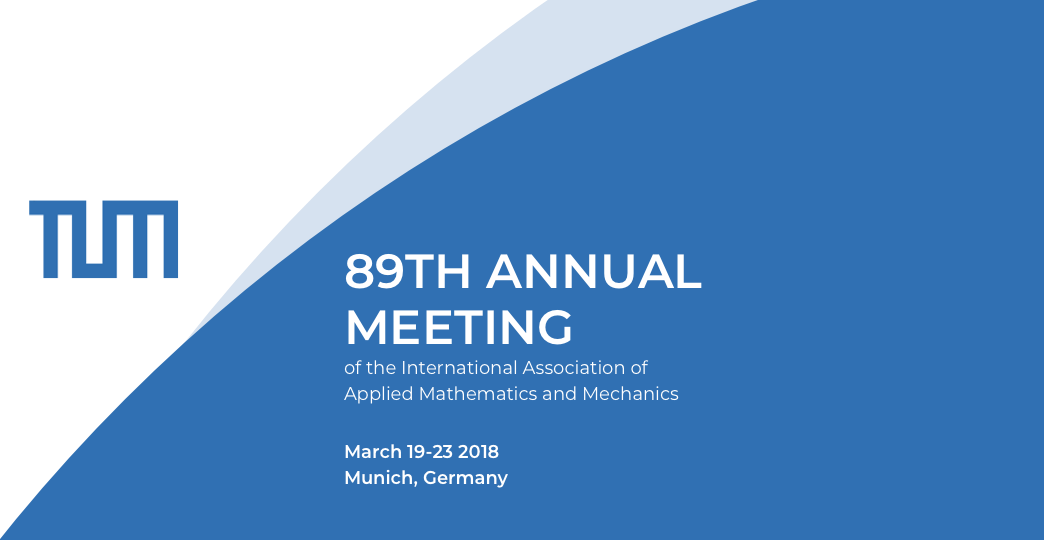MS 1 Adaptive Control with Performance Guarantees
Organizers: Thomas Berger (Hamburg), Stephan Trenn (Kaiserlautern)
Speakers:
- Achim Ilchmann (Technische Universitä Ilmenau): “On the history of funnel control”
- George Rovithakis (ELKE A.P.TH.): “Prescribed Performance Adaptive Control of Uncertain Nonlinear Systems: State-of-the-art and Open Issues”
- Timo Reis (Universität Hamburg): “Funnel control for nonlinear systems with higher relative degree”
- Christoph M. Hackl (Munich School of Engineering): “Non-identifier based adaptive control with internal models for mechatronic energy systems”
- Norman Hopfe (Bayern-Chemie GmbH ): “Funnel Flight Controller for a Simulation Model and a Divert and Attitude Control System”
MS 2 Computational Interdisciplinary Modeling
Organizers: Alexander Ostermann (Innsbruck)
Speakers:
- Christoph Adam (University of Innsbruck): “On computational interdisciplinary modeling for reliability assessment of high-speed train – bridge interaction”
- Martin Arnold (Martin Luther University Halle-Wittenberg): “BLieDF: Lie group time integration for constrained mechanical systems with large rotations”
- Christian Hellmich (TU Wien, Vienna University of Technology): “Modeling bone ultrastructure: mechanics – chemistry – biology – physics”
- Lukas Einkemmer (University of Tuebingen): “Numerical algorithms for plasma physics”
- Marlis Hochbruck (KIT – Karlsruhe Institute of Technology): “On the stability of leap-frog type methods”
- Wolfgang A. Wall (TU München): “Towards better patient care based on computational interdisciplinary modeling”
MS 3 Experimental Mechanics
Organizers: Stefan Diebels (Saarland), Stefan Hartmann (Clausthal-Zellerfeld)
Speakers:
- Malte Schemmann (Karlsruhe Institute of Technology (KIT)): “Characterization and modeling of long-fiber reinforced polymers”
- Michael Johlitz (Universität der Bundeswehr München): “Recent experimental methods to characterise polymer ageing”
- Marcus Stoffel (RWTH Aachen): “Bioreactor development for regenerative tissues of the locomotor system”
- Thomas Lehmann (Chemnitz University of Technology): “Investigations in the field of material mechanics using strain gages”
- Holger Steeb (University of Stuttgart): “Harmonic experiments: Powerfull tools for the characterization of porous materials”
- Stefan Hartmann (Clausthal University of Technology): “From Experiment to Material Parameter Identification”
MS 4 High-Performance Computing for Continuum Mechanics Problems
Organizers: Matthias Bolten (Kassel), Andrea Walther (Paderborn)
Speakers:
- Axel Klawonn (University of Cologne): “FE2TI — Combining Computational Scale Bridging and Domain Decomposition Methods for Dual-Phase Steel”
- Daniel Balzani (Ruhr-Universität Bochum): “A Computational Two-Scale Model for the Simulation Dual-Phase Steels under Cyclic Loading”
- Wolfgang Schröder (RWTH Aachen University): “Trailing Edge Noise Mitigation by Analysis and Optimization of Porosity Parameters”
- Nicolas Gauger (TU Kaiserslautern): “Trailing Edge Noise Mitigation by Analysis and Optimization of Porosity Parameters, Part 2”
- Stefan Turek (TU Dortmund): “Numerical simulation techniques for fluids with complex rheology with special application to rubber polymers”
- Jochen Kroll (TA Instruments ): “Numerical simulation techniques for fluids with complex rheology with special application to rubber polymers, Part 2”
MS 5 PDE Constrainded Optimization under Uncertainty
Many problems in science and engineering are formulated as optimization problems governed by partial differential equations. Mathematical and computational techniques in this field have enabled the solution of complex problems ranging from image processing to fluid flow. However, in most applications the model parameters such as diffusivity in the heat equation or certain reaction rates in reaction-diffusion equations are not known exactly and are therefore modelled as uncertain parameters. This poses a significant challenge since besides having to represent the spatial and temporal components the random variables inherent in the system have to be accounted for. We want to illustrate the latest developments in enabling and understanding PDE-constrained optimization problems under uncertainty with contributions including topics such as the numerical solution of high-dimensional systems or robust optimization methods.
Organizers: Martin Stoll (Chemnitz)
Speakers:
- Peng Chen (The University of Texas at Austin): “Taylor Approximation of PDE-Constrained Optimization Under Uncertainty: Application to Turbulent Jet Flow “
- Stefan Ulbrich (Technische Universität Darmstadt): “Model Order Reduction Techniques with A Posteriori Error Control for Robust Nonlinear PDE Constrained Optimization”
- Felix Lenders (Heidelberg University): “Krylov Space Solver for Optimal Control”
- Karen Veroy-Grepl (RWTH Aachen University): “Certified Reduced Basis Methods for Variational Data Assimilation”
- Peter Benner (MPI Magdeburg): “Low-rank techniques for computing posterior covariance matrices in Bayesian inverse problems “
- Claudia Schillings (University of Mannheim): “Uncertainty quantification for inverse problems”
